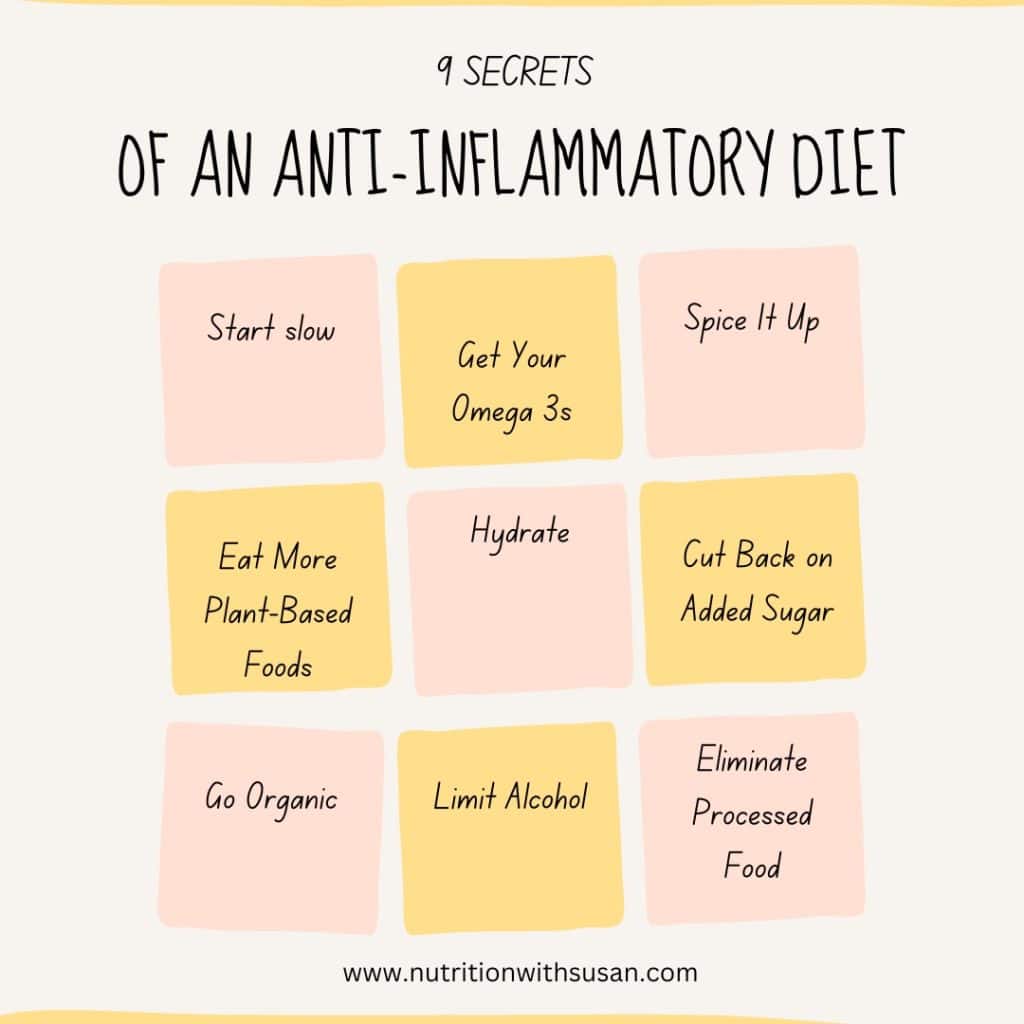Introduction
Over 40? Struggling with inflammation? What if I told you there’s a simple way to improve your health and reduce chronic inflammation? Sound too good to be true? The answer may be simpler than you think.
For women over 40, inflammation can be a real problem. Our bodies are changing and trying to adjust to the hormones that come with menopause.
An anti-inflammatory diet can be a great way to help reduce inflammation and improve your overall health. But making those dietary changes can seem daunting. Here’s the good news – you don’t have to make drastic changes!
In fact, there are 9 simple things you can do right now to start unlocking the secrets to an anti-inflammatory diet that will leave you feeling healthier and more energized than ever before.

9 Secrets Of An Anti-Inflammatory Diet
- Start Slow – Don’t overwhelm yourself by trying to make too many changes at once. Take it slow and focus on one or two things at a time. This will give your body time to adjust while still allowing you to make progress toward your goal of reducing inflammation in the body.
- Get Your Omega 3s – Omega 3 fatty acids are essential for reducing inflammation in the body and should be included in any anti-inflammatory diet plan for women over 40. Try adding salmon, tuna, sardines, or flaxseed oil into your meals at least twice a week for optimal results. Aim to include at least 2 servings per week of fatty fish in your meal plan.
- Spice It Up – Spices like turmeric, garlic, ginger, and cinnamon contain powerful antioxidants that help fight inflammation in the body so try adding them to your meals whenever possible! Incorporating these spices into your meals will not only add flavor but also provide numerous health benefits – win/win!
- Eat More Plant-Based Foods – Plant-based foods are rich in antioxidants which have anti-inflammatory properties. Eating more fruits and vegetables (preferably organic), legumes such as beans, lentils and peas, nuts, and seeds is a great way to boost your intake of antioxidants. Whole grains like quinoa, oats, and brown rice are also excellent sources of dietary fiber which helps to regulate blood sugar levels – another factor that contributes to inflammation.
- Hydrate – Staying hydrated is key when it comes to reducing inflammation in the body so make sure you’re drinking plenty of water throughout the day! Try adding some lemon or cucumber slices if you want something with flavor but fewer calories than other drinks such as sodas or juices.
- Cut Back on Added Sugar – Too much added sugar can lead to inflammation in the body which can cause several health problems including weight gain and diabetes. Try to limit your added sugar intake to no more than 10% of your daily caloric intake (about 24 grams). Instead of reaching for those sugary snacks or sodas opt for healthier sweet treats like fruit or naturally sweetened teas or smoothies.
- Choose Organic When Possible – Eating organic foods is another way to reduce inflammation in the body because they contain fewer chemicals than conventionally produced foods. Opting for organic produce whenever possible is a great way to reduce your exposure to harmful pesticides that can contribute to inflammation in the body. Additionally, organic meats also contain fewer hormones and antibiotics which can also lead to inflammation if consumed too often.
- Limit Alcohol Intake – Excessive alcohol consumption has been linked with increased levels of inflammation in the body which can lead to various health issues including liver damage and poor sleep quality. The recommended amount is one drink per day for women over 40; however, limiting consumption even further may provide additional health benefits such as improved mental clarity and energy levels throughout the day!
- Cut Back on Processed Foods — Highly processed foods typically contain added sugars and unhealthy fats which promote inflammation in the body. Eliminating or reducing processed foods from your diet is imperative if you want to reduce inflammation. Instead try adding more fresh foods like lean proteins (such as chicken breasts or white fish), healthy fats (like avocado), and complex carbohydrates (like sweet potatoes).
Conclusion
If you’re over forty years old and struggling with inflammation, then now is the time to make a change. Incorporating an anti-inflammatory diet into your lifestyle will help you feel better while promoting long-term health benefits too.
By following these 9 secrets of an anti-inflammatory diet you’ll be well on your way towards better physical and mental well-being while also reducing any existing chronic pain or other inflammatory related issues you may be currently experiencing.
Taking control over what we put in our bodies should be one of our top priorities when it comes to fighting off chronic inflammation—and following an anti-inflammatory diet is one great way to do just that!
By eating whole foods, limiting processed food intake, increasing omega 3s intake, adding turmeric dishes into our meals, drinking responsibly/limiting alcohol intake, and staying hydrated all day long we can definitely decrease our risk factors associated with developing chronic conditions due to long-lasting inflammations such as autoimmune disease, diabetes, and cancer.
Remember that every small step counts when it comes to making healthy lifestyle changes; start slow but stay consistent—your future self will thank you!
If you’re ready to get started and want extra support, check out my program offerings. So, let’s get started today – you’ll be glad you did!
***Disclaimer: This post is for informational purposes only and should not be construed as medical advice***


